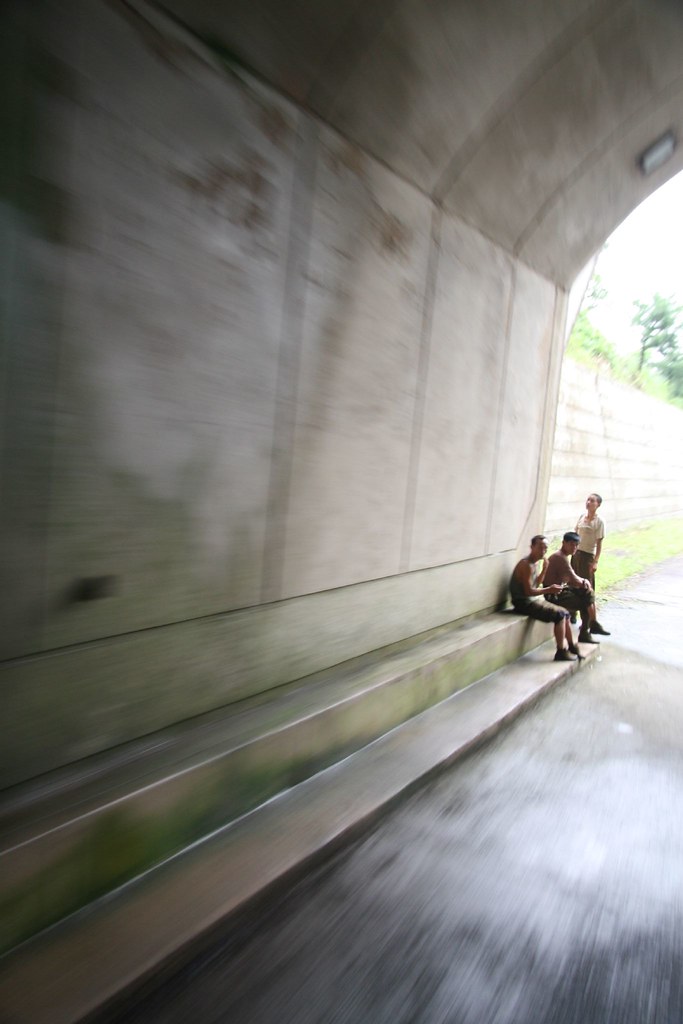9/07/2009
North Korea - At the the end of the tunnel
This is one of the first pics I took in North Korea to really start leaving an impression on me.
This was taken through a cracked open window, on the bus heading down the "highway" on the way towards Kaesong Village. I put "highway" in quotations because in the 2~3 hours we were driving, we only encountered 8 or 9 vehicles total. That includes the construction dump-trucks that served as buses for the junior-military (AKA: construction crew) and the radio-trucks for blasting "patriotic" music to inspire the workers during their backbreaking duties.
A week before we flew to North Korea, on October 18th 2007, there was a series of torrential rainstorms that flooded and ruined farmland, and devastated many mountainside villages. Under the support of the Soviet regime, the industrial machine of North Korean industry dramatically outperformed that of the Agrarian South Korea of the 60's and 70's. However, such dramatic industrialization had a devastating effect on parts of the landscape, and large swathes of the forests along mountainsides were cleared out, without any seedlings planted in their wake.
Following decades of deforestation, the gradual cycle between alternating periods of floods and droughts, now leads to serious landslides that afflict many of the mountainsides across the country. I caught these workers under a bridge, just before exiting the tunnel, and getting my first sight of the results of those landslides.
I decided to display this one, rather than the following pics of the roadside labor crews, that were trying to stem the flow of the landslides, and reconstruct collapsed infrastructure, using only their bare hands, crude tools, and Oxes. The only vehicles used for this work, were dump-trucks that doubled as buses and trucks... that simply served as radio loudspeakers.
The people I met in North Korea were quite warm and friendly, and certainly had their own complicated personal lives, and loving relationships with friends and family. I interviewed a girl, whose parents were soldiers, but she was going to University to become a movie scriptwriter, and I interviewed guys who like to play soccer and go drinking with their buddies on the weekends. Strangely enough, most of the people I talked to were politically apathetic for the most part. To be safe they had to tow the political line, or suffer the consequences... but being so busy, stressed, and involved in their personal lives. Including many who are struggling just to put food on the table, literally. I didn't come across much discussion of the direction the country was going in. From the outside, I guess it's relatively easy to get an idea of the impression your country is leaving on the rest of the World, but when you're inside and only exposed to domestic media, it's that much harder to gain a wider perspective, and that much harder to begin sowing the seeds that lead to political change.
I'll go into detail in future entries, but one of the main inspirations for my graduate research, was discovering the underground NGOs that are focused on not just getting news and information out from North Korea, but also ones, like AsiaPress, NKNet, and Radio Free Korea, that are focused on getting information out-of, into, and around North Korea. It's really hard to be critical if you're not aware of the problems, and the only way to do that is through a free press. While a free press is still illegal in North Korea, and crippled and compromised in many other countries, active support for underground-citizen-journalism in countries without the right-of-free-speech is an important step on the road to finding the light at the end of the tunnel for those still living under dictatorships.
Subscribe to:
Post Comments (Atom)


No comments:
Post a Comment